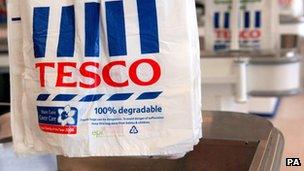Is this the end of Tesco's UK growth?
- Published
- comments

The profits of the UK's largest retailer, Tesco, rose - albeit at a reduced pace - all through the 2008-9 recession and beyond.
Not any more. Tesco said today that it anticipated minimal trading profit growth next year, and a performance in the current year at the bottom end of expectations.
The company admits it misjudged the desire of its British customers for promotional discount coupons in these straitened times - and its underlying sales fell, when those of its main rivals either rose or stagnated.
Unsurprisingly - but shockingly for a business widely perceived to be the model of stability - its shares have plummeted more 14% in value at the time of writing, wiping almost £4bn off the value of the company.
Direct comparisons with the underlying sales performance of other supermarket groups are always complicated, because they measure so-called like-for-like sales in marginally different ways and for differing time periods.
But it is clear that Tesco's UK sales per unit of selling space - a 2.3% fall in UK like-for-like sales excluding petrol and VAT in the six weeks to 7 January and a 1.3% fall including the impact of the VAT increase - is worse than competitors'.
Excluding fuel and VAT, Sainsbury, Waitrose and M&S (in food) all did quite a lot better, and Morrison did a bit better.
The big question is whether Tesco's British problems are mainly the result of pricing errors made in the past few months by the new chief executive, Philip Clarke, who took over from Sir Terry Leahy in March, or whether they represent structural flaws that Mr Clarke inherited.
To put it more crudely, is this Mr Clarke's mess or one bequeathed to him by his predecessor, who ran the company for 15 years and turned Tesco into the global giant that it is today?
And, if the problems are structural, how easily can they be sorted?
Companies have an organic quality. They have a lifecycle. No business continues on a path of unbroken growth forever.
Typically the massively successful ones such as Tesco - businesses whose achievements redefine an entire industry - capture market share until improved competition, regulation or management arrogance and complacency brings the expansion to a juddering halt.
With its third share of the groceries market, Tesco has found itself subject to increased regulatory scrutiny and pressures, while the likes of Sainsbury and Morrison have sharpened up their own acts, and - perhaps - Tesco's UK management has been stretched by its huge ambitions to be much bigger overseas, in banking and on the internet.
Some companies, when they hit the wall in that way, have the capacity to reinvent or reinvigorate themselves: IBM and GE would be global multinational examples of that kind of renewal; in a smaller and less ambitious way, Sainsbury under Justin King also represents revival after stagnation.
But there are costs and risks to remaking such a big business. And what is striking is that today the owners of Tesco, the shareholders, are worrying about would happen if Phil Clarke is unable - as happened to Marks & Spencer in the 1990s - to restore momentum.
I will be interviewing him in a few minutes. So I will relay to you whatever he says that seems relevant to an assessment of just what kind of turning point this is for Tesco.
UPDATE 14:10 GMT
The message from Philip Clarke, who took over as Tesco's chief executive in March, is that the UK's biggest retailer made a short-term mistake and has a longer-term problem.
In an interview with me, he said the immediate error was not to match the money-off coupons that were being offered by its main rivals in the run-up to Christmas.
So having cut its prices across the board, Tesco's dedicated customers handed less money to the retailer for the stuff in their respective baskets.
And this deflationary reduction in money going into tills was not offset by any additional purchases by less loyal shoppers who go from chain to chain looking for the best bargains.
However he concedes there was a more fundamental weakness, which is that the group under-invested in the UK stores over the past few years, as it concentrated its expansion on Asia, Eastern Europe, the US, banking and the internet.
In the years since the 2008/9 recession, the UK managed to generate maximum profits rather than maximum sales, he implies.
And in his view this means there were and are too few employees in stores. So, for example, checkout queues can be too long and shelves may not be as well stocked as they should be.
He is planning to remedy all this. In the next year and a bit, there will be a big investment in what he describes as the "experience" for British shoppers, with thousands more people hired (Tesco already employs 300,000 in the UK and half a million around the world) and store layouts changed.
The scale of the required investment will be very significant, enough to prevent any rise in profits in 2012/13.
He is under no illusion of the importance of the moment. He recognises that what is at stake is whether the core of this huge global business, the UK stores, can regain their vitality or must become reconciled to long-term stagnation or even shrinkage.
He is an optimist. And he insists that Tesco has reinvented and reinvigorated itself several times in a 90-year history. But Tesco has never before had to mend itself when in a position of such huge market share and dizzying spread of domestic and international operations.